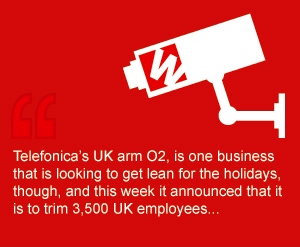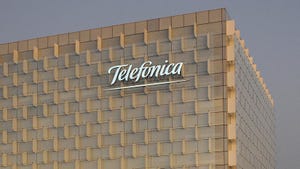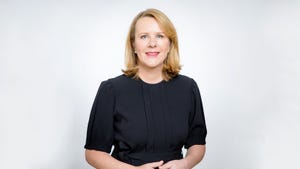With summer supposedly fast approaching, many look to trim some fat and get in shape for the sunny months. The Informer has never been a huge fan of gyms; in fact his favourite machine in the gym is the one that sells chocolate. Telefonica's UK arm O2, is one business that is looking to get lean for the holidays, though, and this week it announced that it is to trim 3,500 UK employees.
June 14, 2013

By The Informer
With summer supposedly fast approaching, many look to trim some fat and get in shape for the sunny months. The Informer has never been a huge fan of gyms; in fact his favourite machine in the gym is the one that sells chocolate. Telefonica’s UK arm O2, is one business that is looking to get lean for the holidays, though, and this week it announced that it is to trim 3,500 UK employees.
Staff are not so happy and O2 is facing the prospect of strike action, with the Communication Workers Union currently holding a ballot to determine whether or not its members down tools. Or headsets.
Upon signing an outsourcing deal with Capita a couple of weeks ago O2 said it was looking to make 500 to 600 voluntary redundancies. It must have been a good offer (or an unpleasant job) as 600 volunteers snapped up the package right away. In fact demand exceeded supply, it would seem, as the operator then announced that it would offer voluntary redundancies to a further 400 employees. This is all in addition to the transfer around 2,500 O2 call centre staff to Capita.
The move sparked anger from the CWU, a union which represents UK employees at fixed line and mobile operators. The union had some harsh words for O2, saying the operator’s actions are not that of “how a decent, responsible employer should behave”.
O2, as one would expect, took exception to the criticisms, and drafted a statement explaining that employees being transferred to the outsourcing firm will see no change to where they work or their terms and conditions while their salary will be protected.
The operator added that Capita will offer employees a guarantee of job security for two years, which is something that the operator could never commit to itself.
One of the drivers behind the deal is that O2 is seeing a significant decline in the numbers of customers contacting it by phone, the operator said. O2 now takes one million fewer calls from customers per month than it did two years ago. Apparently customers increasingly rely on social media and online customer care portals to contact the firm. Or perhaps they’ve just given up trying to get help entirely.
“By making this decision now, we have been able to secure the best outcome for our people,” the spokesperson said. The result of the strike ballot is due on June 18, 2013.
In other news this week, one of the industry’s high-profile figures, Orange group CEO Stéphane Richard, was taken into custody in France as part of an investigation into alleged corruption dating back to 2008. The case does not involve Orange, which was still going by the France Telecom brand name at the time; Richard previously worked in the French Finance Ministry and he faces questions relating to his role in a 2008 payment made to businessman Bernard Tapie. France Télécom’s deputy CEO and chief financial officer Gervais Pellissier is filling in while Richard stacks his time.
Elsewhere, the industry is looking to step up the extent to which it collaborates on SDN, as a total of 23 businesses have given their backing to open source initiative the OpenDaylight Project. The project has committed to develop a common and open SDN platform on which developers can build commercial products and technologies.
Cyan, Huawei, Inocybe Technologies, Plexxi and Radware were this week announced as new members to help further the development of open source SDN. The OpenDaylightProject already has 18 members, including firms such as Cisco. Citrix, IBM, Intel Red Hat and VMware
The idea is that, as the industry moves toward widespread adoption of SDN, an open reference framework for programmability and control is needed and each new member will be using OpenDaylight to deliver enhancements to products and services and provide additional value to their customers.
Software defined networking is being heralded as the next technology to “change the way we think about networking and the way that IT infrastructure is put together,” according to Inder Gopal, board chair for OpenDaylight.
The move to LTE is driving a need for greater network flexibility, scalability and cost performance and the nature of the evolution is illustrated by the list of main stakeholders; IT vendors are now entering the telecoms market since SDN (or virtualisation) is a concept widely used in the IT market.
Chinese vendor Huawei has introduced a business initiative designed to explore the application scenarios for SDN in carrier networks, to help operators better understand the technology’s commercial value.
The Business Initiatives Zoom-in (BIZ) programme is geared understanding the business needs that drive t the future of technological development in the ICT industry, whereas the company’s SoftCOM strategy, launched in February, is more technological in nature.
Based on the principles of cloud computing, software-defined networking (SDN), and network function virtualisation (NFV), SoftCOM creates opportunities to boost revenues and reduce costs, Huawei said.
There was more drama this week regarding the Softbank, Dish, Sprint and Clearwire saga; a plot that’s already had more than its fair share of twists.
Japanese operator Softbank has upped its offer for US carrier Sprint by $1.5bn to $21.6bn as it strives to secure shareholder acceptance, in face of competition from Dish Network. As well as increasing the total amount payable the deal has been restructured to give shareholders an additional $4.5bn.
Softbank’s share in New Sprint (the holding company which will own Sprint if the deal goes through) rises to 78 per cent under the amended offer.
Sprint’s board of directors has given this latest offer its unanimous support, having ended negotiations with US satellite provider Dish Networks on the basis that Dish did not “put forward an actionable offer”. Dish, which laid a $25.5bn bid for Sprint on the table in April, said it would consider its “strategic options”.
“The amended agreement delivers more upfront cash to Sprint stockholders, while still achieving our goal of creating a well-capitalized Sprint that is better positioned to bring meaningful competition to the US market,” said SoftBank CEO, Masayoshi Son. “Our transaction offers significant value for Sprint stockholders and the opportunity to realize that value in just a few weeks, without the risks associated with any other potential transaction.”
The increased return to shareholders will be covered in part by the additional $1.5bn and in part by a $3bn reduction in the $8bn that had been set aside under the original terms to strengthen the Sprint balance sheet. Sprint and Softbank expect the deal to close in July.
However, Dish Network also gained a little ground this week, as wimax operator Clearwire’s board of directors unanimously voted to accept the satellite provider’s bid for its outstanding shares, rather than Sprint’s.
Dish Network has offered to acquire all outstanding common shares of Clearwire at a price of $4.40 per share while Sprint offered just $3.40 per share. Clearwire’s Board voted for Dish based on recommendations from its Special Committee; a group consisting of independent, non-Sprint-affiliated directors.
Sprint will still remain the controlling shareholder in the company though, even if all outstanding common shares are sold to Dish, as it would still have 50.4 per cent of the voting shares and 68.2 per cent of the equity.
Over in South Africa, mobile operator Telkom has written down the value of its assets by R12bn ($1.2bn) following a review by its board, claiming that revaluing its assets is important in enabling it to become competitive and efficient.
The man in the Telkom hotseat, Sipho Maseko, took the over from former CEO Nombulelo Moholi in April of this year. He left Vodacom, where he was COO and in his new role as Telkom group CEO, he said: “We are committed to transforming Telkom’s financial performance. This will require bold and decisive action. Tough and urgent decisions will have to be made, particularly regarding costs and the decommissioning of unprofitable services.”
The Telkom board explained the reasons it wrote down its assets, which included the extensive time period that shares have been trading at a lower value to its net asset value (NAV) and the obsolescence of some of its legacy assets.
And Canadian operator Mobilicity has announced that its proposed acquisition by Telus has been officially abandoned. Telus agreed to acquire Mobilicity in May for $380m, pending regulatory approval. However, last week Canada’s government blocked Telus’ application to acquire Mobilicity’s spectrum licences, effectively scuppering the deal.
Mobilicity will now revert to its previously announced strategy, the end game of which remains its acquisition. The plan will be voted on by debtholders at a meeting on June 25, 2013.
There is some hope for the Canadian operator as rival Wind Mobile has indicated that it now wants to open talks to buy Mobilicity, according to CEO Anthony Lacavera.
“We are certainly interested in re-opening the discussion with Mobilicity,” he said.
Back in Europe and Vodafone has confirmed that it is holding preliminary discussions about a possible acquisition of German cable group Kabel Deutschland. UK-based Vodafone stressed that there is “no certainty that any offer will ultimately be made nor as to the terms on which any such offer might be made”.
If it does acquire Kabel Deutschland, Vodafone will become the largest TV provider in Germany, which is the operator’s largest market.
“Vodafone’s pragmatism provides further evidence that European telcos are now in survival mode and that anything that helps them to overcome the challenges they face is fair game,” commented Emeka Obiodu, principal analyst for telco strategy at Ovum.
And a survey this week suffested that the willingness to pay a premium for 4G services is generally lower in mature markets than in emerging markets. Accenture surveyed 31,000 consumers in 26 countries to understand what CSPs must do to address their needs.
It found that mobile subscribers worldwide have an appetite for speed, with the vast majority citing speed of mobile internet connections as the top differentiator for communication services providers. Nearly two-thirds said they would pay a premium for mobile internet services that are 10 times faster than their current connection.
However, the report found disparities in consumers’ willingness to pay for faster services. An average of only 57 per cent of all respondents in the mature markets surveyed said they were willing to pay a premium, excluding Italy and Finland, where the averages were 70 per cent and 71 per cent respectively. In contrast, an average of 76 per cent of consumers in emerging markets said they would pay more for 4G. 83 per cent of customers in Brazil and Russia said they would be willing to pay a premium.
And finally, Apple has reworked its mobile operating system iOS with its seventh iteration. The platform has had a major overhaul with a new look and feel, six years of after the first operating system was launched on the original iPhone.
Apple claims that iOS7 has a simpler interface and features such as iTunes Radio, a Music application, AirDrop file-sharing between iOS devices, and audio-calling using FaceTime have been introduced. As is the case with every post-Jobs Apple announcement, the sceptics made their voices heard once again. Van Baker, VP and research director at Gartner, said that an overhaul of its mobile platform is only one of the steps Apple must take in order to remain in its dominant position in the mobile space.
“Apple needs to continue to advance the platforms, and eventually they will need to introduce a new product category that is well accepted by the market. This is their history and the more time that passes before this happens, the more that the industry will question Apple’s ability to innovate,” he said.
And that’s about all for the week – take care,
The Informer
Read more about:
DiscussionYou May Also Like





.png?width=300&auto=webp&quality=80&disable=upscale)

.png?width=300&auto=webp&quality=80&disable=upscale)
_1.jpg?width=300&auto=webp&quality=80&disable=upscale)



.png?width=800&auto=webp&quality=80&disable=upscale)